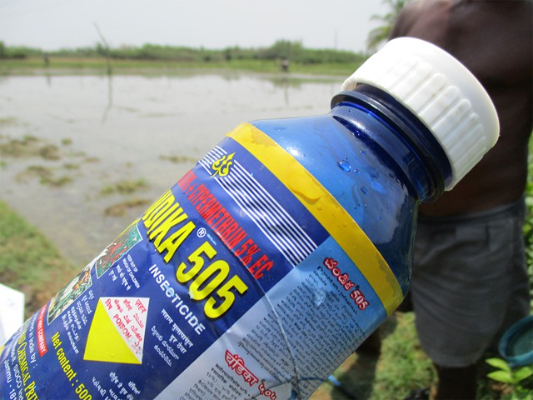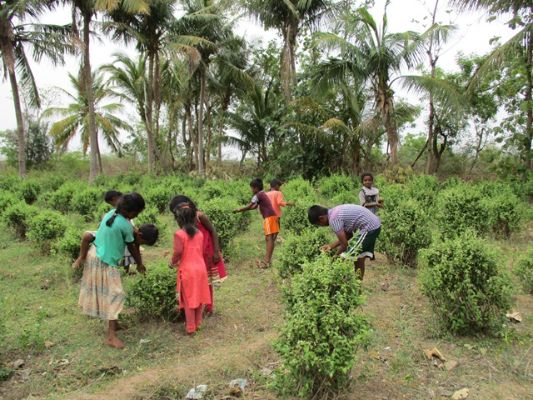World Environment Day: Ban On Child-harming Pesticide Urged

PAN Asia Pacific (PANAP) today urged regulatory authorities to ban cypermethrin, a Highly Hazardous Pesticide (HHP) still widely used in Asia. This call comes at the heels of the European Union’s (EU) recent decision to withdraw the approval of cypermethrin, compelling Member States to no longer approve products containing the active substance by December 2021 at the latest.
Cypermethrin is part of the PANAP’s Terrible Twenty pesticides that are especially toxic to children. Cypermethrin is a pyrethroid that is linked to long term behavioural problems in children. It is immunotoxic and an endocrine disruptor. Other potential hazards to children include acute poisoning, developmental disorders, as well as breast cancer, male reproductive problems, and Parkinson’s disease later in life.
In Asia, cypermethrin is still widely used as a household insecticide and in farms. In Malaysia, for instance, the use of cypermethrin is allowed; while in India, cypermethrin is restricted and can only be used for pest control by a licensed operator.
However, a study by PANAP, PAN India, and Society for Rural Education and Development in floriculture farms in Tamil Nadu, India revealed the common use of cypermethrin. It was identified as an active ingredient in four products used by farmers and to which children working as informal labourers in flower farms are exposed to. In the study, children exposed to pesticides experienced dizziness, fatigue, vomiting and skin lesions. They were facing difficulties in concentrating at school, among other symptoms of poisoning.

Meanwhile, in a separate study by PANAP, CGFED, and Centre for Sustainable Rural Development entitled Schoolchildren’s Exposure to Pesticides in Vietnam, cypermethrin was among the pesticides identified by teachers as commonly sprayed in agricultural fields, which are located less than one kilometer away from schools. The study shows that Vietnamese schoolchildren exhibit symptoms of poisoning whenever they are exposed to pesticides inside homes and schools.
“To protect our children from toxic pesticides, we are advocating for a mimimum one-kilometer pesticide-free buffer zone around schools. That is an initial step. In the long run, we must ban Highly Hazardous Pesticides that have been proven to cause irreparable harm to children, especially in rural communities,” said Deeppa Ravindran, PANAP’s campaign coordinator.
“The EU has taken a positive step with regards to cypermethrin. But we should be aware that double standards exist, wherein pesticides banned in their countries of origin are still exported to the Global South. Therefore a global ban of HHPs—which PANAP has been calling for—is the only lasting solution to address the poisoning of children, along with the promotion of agroecological alternatives,” she added.
PAN Asia Pacific (PANAP) is one of five regional centres of Pesticide Action Network, a global network dedicated to the elimination of harm upon humans and the environment by pesticide use. It is based in Penang, Malaysia.


 Science Media Centre: Dengue In The Pacific Region – Expert Q&A
Science Media Centre: Dengue In The Pacific Region – Expert Q&A New Zealand Defence Force: NZDF Prepares For Major Warfighting Exercise In Australia
New Zealand Defence Force: NZDF Prepares For Major Warfighting Exercise In Australia Greenpeace: Dairy Industry Greenwashing Under Fire As Lawsuits Go Global
Greenpeace: Dairy Industry Greenwashing Under Fire As Lawsuits Go Global Greenpeace: French Authorities Block Greenpeace Ship From Participating In UN Ocean Conference
Greenpeace: French Authorities Block Greenpeace Ship From Participating In UN Ocean Conference ITUC: Workers' Rights Collapse Across The World - ITUC Global Rights Index 2025
ITUC: Workers' Rights Collapse Across The World - ITUC Global Rights Index 2025 UN News: Deadly Flooding In Nigeria Displaces Thousands
UN News: Deadly Flooding In Nigeria Displaces Thousands